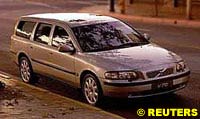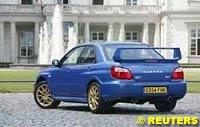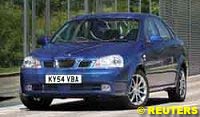

Automotive News and Reviews for the Petrolhead
In this week's issue:
- Car Briefs
- Carmakers Hunt for Next Big Thing in Paris
- Ford Lifts Profit Forecasts
Apparently, the root of the problem is faulty wiring which could lead to a short-circuit in the fan and eventual overheating. There have been a handful of fires reported as a result of the problem, but no-one has been injured.
The price is £11,995 or £10,995 (until the end of September 2004, including three years free servicing). That makes the SE £1,000 more than the GSI, which is a good price for those who want a DVD system to keep the kids quiet
At the top of the range is a new version of the Impreza WRX STi Type-UK, which gains a revised chassis with wider rear track, a driver's control centre differential (the driver can vary the power split between front and rear wheels) and wider 17 x 8 inch wheels. The price is now £25,995.
At the bottom of the range, the 2.0 GX saloon and 5-door now start at £14,500 and £15,150 respectively - reductions of £450 and £300. There have been minor specification changes, including 16 inch alloy wheels and a slightly revised dashboard.
Mass-market carmakers head into the Paris auto show, which opens to the press on Thursday, grasping for the spark that could ignite tepid sales growth and boost profits in a sector showing serious signs of fatigue.
With global manufacturing capacity exceeding demand by a quarter and prices under constant pressure, many carmakers have settled into a beggar-thy-rival approach that hinges on pumping out new models and winning market share at practically any cost.
That has led to ferocious competition, dwindling profit margins, intense pressure to cut labour costs and stock market valuations that by no means reflect the fact that the sector accounts for a tenth of wealthy countries' economic output.
"The industry is facing perhaps 10 years of difficulties and it needs to do something different than what Volkswagen, for example, is doing at Wolfsburg by simply cutting the cost of labour. That is not going to solve the problem," said Graeme Maxton, managing director of consultancy Autopolis.
"They squeeze their suppliers to death. They crush the dealers to make sure that they are almost at the brink of bankruptcy and then they go and give 1,400-euro or $5,000 incentives to sell cars. Something is wrong with the model."
Underscoring the sector's tough times, British luxury carmaker Jaguar announced plans on Friday to cut 1,150 jobs and consolidate output as a way to remove excess capacity. Credit Suisse First Boston downgraded the European auto sector to "underweight" from "market weight".
"With slowing production and rising raw materials costs, we would avoid suppliers and tyres altogether, as well as low-margin (automakers)," the bank said, adding that carmakers' second-quarter earnings may have been the peak for 2004.
Models, Models Everywhere
But sparkling new cars rather than sweeping structural changes are on the agenda for Paris as automakers roll out fresh models in an effort to lure wary customers into showrooms. Some 60 new models will appear, with the spotlight on the mass-market "C" segment that is crucial for European sales.
The new Ford Focus will vie for attention with the Citroen C4, the Opel Astra GTC from General Motors' European division, the Volkswagen Golf V GTI and DaimlerChrysler's revamped A-class car. Premium carmaker BMW's new 1-series car - its smallest so far - is also encroaching on the sector, as is VW luxury unit Audi's A3 Sportback.
Ironically, the range of new cars is weighing on profits by limiting the sales potential of individual models, thus eroding the economy of scale that large production runs bring. Speed freaks will get their standard dose of high-powered cars in Paris, while DaimlerChrysler will show off its Mercedes "vision B" concept car, a 5-seat sport wagon, and its "vision R" grand sports wagon with three rows of seats.
France's Renault and PSA Peugeot Citroen, two of Europe's most successful mass carmakers, will promote super-mini cars on their home turf, while Renault presents the cut-price Logan for emerging markets with a 5,000-euro price tag. The question is whether the plethora of new models will help sales, which analysts say may rise by only about 1 percent this year in Europe amid weakness in key markets Germany and France.
That has prompted Fiat, Ford's Jaguar, Opel and Volkswagen to curb production of at least some models this year, raising questions about where growth will arise. US sales have also faltered of late despite generous incentives, prompting GM and Ford to cut production plans.
China remains the fastest-growing market, but carmakers' profits there are sliding as Beijing taps the brakes on an overheating economy. Billions of dollars pouring into new plants raise fears of a margin-sapping glut that could spill over into an export threat before the end of the decade.
European and US carmakers will be looking over their shoulders at Japanese and Korean rivals whose robust offerings are seizing market share in Europe thanks to their world-class quality, sharp designs and popular diesel engines.
Toyota became the world's number-two carmaker by offering well-made, fuel-efficient cars, a recipe that Korean manufacturers like Hyundai are copying successfully.
"They offer value for money that competes very strongly against the western Europeans and they have interesting products," Ferdinand Dudenhoeffer, head of German automotive forecasting group B&D, said of the Koreans.
He was upbeat about prospects for the car industry, suggesting quicker economic growth would help push global cars sales to 55.1 million units in 2006 from 50.2 million last year.
Ford has raised its third-quarter and 2004 profit forecasts because of strength in its financial services business and cost improvements in its car operations.
Ford, which last week set plans to cut 1,150 jobs at its main Jaguar production facility in Britain, said it expects third-quarter earnings of 10 cents to 15 cents per share, up from a prior estimate of break-even to 5 cents per share. For the full year, it expects to earn $1.90 to $2 per share, up from a previous estimate of $1.80 to $1.90. The quarterly and annual estimates exclude any costs from the Jaguar actions and other special items.
Wall Street analysts, on average, have been expecting earnings of 9 cents per share in the third quarter and $1.99 for the full year, according to Reuters Estimates. Ford said the improvement primarily reflects continued strong performance in its financial services business and lower costs in the automotive sector, partially offset by lower production at Jaguar.
Together with previously announced 2004 special items, these actions are expected to reduce full-year 2004 net earnings by about 25 cents per share, Ford said.
![]() Car Briefs
Car Briefs
 Volvo is recalling over 450,000 models built between 1999 and 2002 to replace a fan, which could start a fire. The models concerned are all the larger Volvos: S60, V70 and S80.
Volvo is recalling over 450,000 models built between 1999 and 2002 to replace a fan, which could start a fire. The models concerned are all the larger Volvos: S60, V70 and S80.
 Hyundai has introduced a new special edition Matrix. Fitted with the 1.6 litre petrol engine the SE is based on the GSI with the addition of a DVD multimedia system (with headrest mounted screens), privacy glass and reversing sensors.
Hyundai has introduced a new special edition Matrix. Fitted with the 1.6 litre petrol engine the SE is based on the GSI with the addition of a DVD multimedia system (with headrest mounted screens), privacy glass and reversing sensors.
 Subaru seems to be going through a hyperactive phase at present. Having announced both the Legacy Spec B and Forester 2.5 in the last few weeks, there is now a revised Impreza.
Subaru seems to be going through a hyperactive phase at present. Having announced both the Legacy Spec B and Forester 2.5 in the last few weeks, there is now a revised Impreza.
 After many months of speculation GM has confirmed that Daewoo models will be rebranded Chevrolet in Europe from 2005. GM bought a controlling interest in Daewoo cars following the bankruptcy of the whole group in the wake of the Asian financial crisis of 1998. The rebranding makes sense because there are car factories in Eastern Europe still under the control of the original Daewoo company, leading to a potential brand conflict. Still, it will take Europeans some time to get used to the idea of small cars being called Chevrolets.
After many months of speculation GM has confirmed that Daewoo models will be rebranded Chevrolet in Europe from 2005. GM bought a controlling interest in Daewoo cars following the bankruptcy of the whole group in the wake of the Asian financial crisis of 1998. The rebranding makes sense because there are car factories in Eastern Europe still under the control of the original Daewoo company, leading to a potential brand conflict. Still, it will take Europeans some time to get used to the idea of small cars being called Chevrolets.
![]() Carmakers Hunt for Next Big Thing in Paris
Carmakers Hunt for Next Big Thing in Paris
![]() Ford Lifts Profit Forecasts
Ford Lifts Profit Forecasts
| Contact the Editor |
© 1995-2005 Kaizar.Com, Inc. . This service is provided under the Atlas F1 terms and conditions.
|
Volume 10, Issue 38
Atlas F1 Special
Jaguar: All Out of Lives
Last to Know, First to Go
The Tarnished Mascot
Articles
The Gold Rush
Revved Up: Q&A with Shoichi Tanaka
Every Other Sunday
2004 Chinese GP Preview
2004 Chinese GP Preview
Chinese GP Facts & Stats
Columns
The F1 Trivia Quiz
Bookworm Critique
On the Road
Elsewhere in Racing
The Weekly Grapevine
> Homepage |